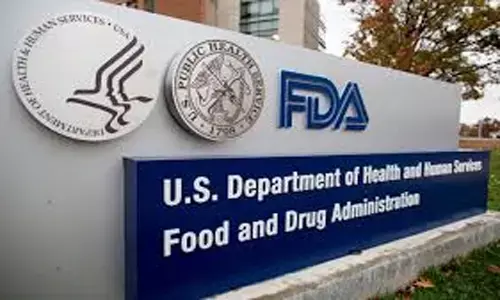- Home
- Medical news & Guidelines
- Anesthesiology
- Cardiology and CTVS
- Critical Care
- Dentistry
- Dermatology
- Diabetes and Endocrinology
- ENT
- Gastroenterology
- Medicine
- Nephrology
- Neurology
- Obstretics-Gynaecology
- Oncology
- Ophthalmology
- Orthopaedics
- Pediatrics-Neonatology
- Psychiatry
- Pulmonology
- Radiology
- Surgery
- Urology
- Laboratory Medicine
- Diet
- Nursing
- Paramedical
- Physiotherapy
- Health news
- Fact Check
- Bone Health Fact Check
- Brain Health Fact Check
- Cancer Related Fact Check
- Child Care Fact Check
- Dental and oral health fact check
- Diabetes and metabolic health fact check
- Diet and Nutrition Fact Check
- Eye and ENT Care Fact Check
- Fitness fact check
- Gut health fact check
- Heart health fact check
- Kidney health fact check
- Medical education fact check
- Men's health fact check
- Respiratory fact check
- Skin and hair care fact check
- Vaccine and Immunization fact check
- Women's health fact check
- AYUSH
- State News
- Andaman and Nicobar Islands
- Andhra Pradesh
- Arunachal Pradesh
- Assam
- Bihar
- Chandigarh
- Chattisgarh
- Dadra and Nagar Haveli
- Daman and Diu
- Delhi
- Goa
- Gujarat
- Haryana
- Himachal Pradesh
- Jammu & Kashmir
- Jharkhand
- Karnataka
- Kerala
- Ladakh
- Lakshadweep
- Madhya Pradesh
- Maharashtra
- Manipur
- Meghalaya
- Mizoram
- Nagaland
- Odisha
- Puducherry
- Punjab
- Rajasthan
- Sikkim
- Tamil Nadu
- Telangana
- Tripura
- Uttar Pradesh
- Uttrakhand
- West Bengal
- Medical Education
- Industry
FDA approves ustekinumab for plaque psoriasis in kids

HORSHAM -- The U.S. Food and Drug Administration (FDA) has approved an expanded indication for STELARA (ustekinumab) as a treatment for pediatric patients (6-11 years of age) who struggle with the skin lesions or plaques associated with moderate to severe plaque psoriasis (PsO).
STELARA is the first and only biologic to target interleukin (IL)-12 and IL-23 approved by Food and Drug Administration for pediatric psoriasis use, providing a new proven treatment for children (6-11 years of age) who have had few available options.
STELARA targets both interleukin (IL)-12 and IL-23, two cytokines thought to play an important role in modulating the overactive inflammatory response in a number of autoimmune conditions, including PsO. STELARA is administered as an injection given under the skin, dosed four times per year after two starter doses.
The food and drug administration has granted approval to The Janssen Pharmaceutical Companies of Johnson & Johnson.
Plaque psoriasis is the most common form of psoriasis in adults and children.About one-third of people with psoriasis first have symptoms before the age of 20 years and approximately 20,000 children under the age of 10 are diagnosed with psoriasis.
Plaque psoriasis presents differently in all patients, making it a challenging disease to both diagnose and treat. Especially in the pediatric population, it is important for patients, parents and physicians to work together to identify an appropriate treatment," said Stacie Bell, Ph.D., Chief Scientific and Medical Officer, National Psoriasis Foundation. "The approval of new treatment options is an exciting step forward to address the unmet needs of children living with psoriasis."
"We are thrilled that the latest approval for STELARA will bring an alternative class of medication to this patient population and that we are able to deliver on our promise to find meaningful solutions for people afflicted with immune-mediated diseases," said Lloyd Miller, M.D., Ph.D., Vice President, Immunodermatology Disease Area Leader, Janssen Research & Development, LLC. "While STELARA is currently available for adults and adolescents 12 years and older, children with plaque psoriasis have had more limited treatment options."
The Food and Drug Administration (FDA) approval of STELARA for pediatric use is based on results from the CADMUS Junior study, an open-label, single-arm, multicenter phase 3 clinical trial, of 44 patients with moderate to severe plaque psoriasis in which 77 percent of patients achieved clear or almost clear skin, at week 12 after two doses. Secondary endpoints included the proportion of patients achieving 75 percent or 90 percent improvement in their Psoriasis Area and Severity Index (PASI) score at week 12 compared to baseline. Study results showed 84 percent and 64 percent of patients achieved a PASI 75 response and PASI 90 response, respectively. In general, the safety profile observed in CADMUS Junior was similar to the safety profile from studies in adults with plaque psoriasis.1 Patients knew they were on STELARA for the entirety of the study, which may affect results.
For further reference log on to: https://bit.ly/395z0b
Dr Kamal Kant Kohli-MBBS, DTCD- a chest specialist with more than 30 years of practice and a flair for writing clinical articles, Dr Kamal Kant Kohli joined Medical Dialogues as a Chief Editor of Medical News. Besides writing articles, as an editor, he proofreads and verifies all the medical content published on Medical Dialogues including those coming from journals, studies,medical conferences,guidelines etc. Email: drkohli@medicaldialogues.in. Contact no. 011-43720751


